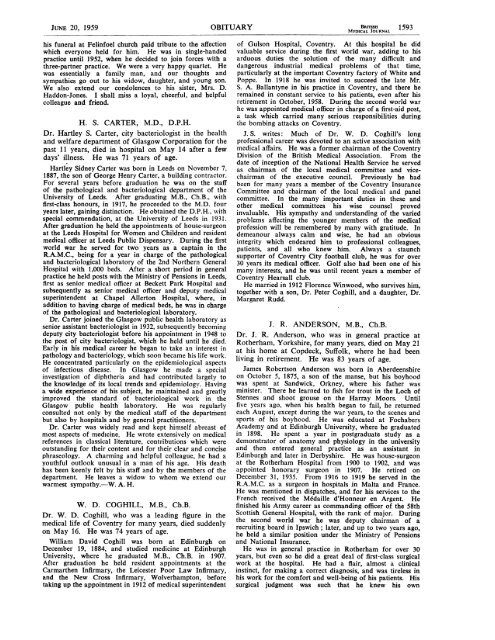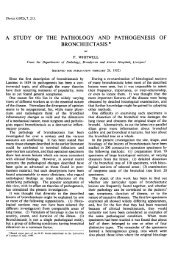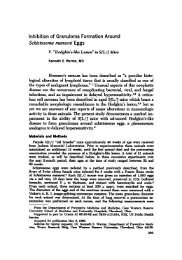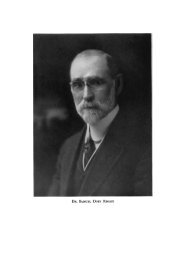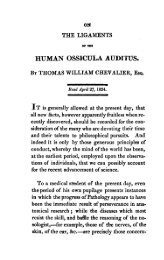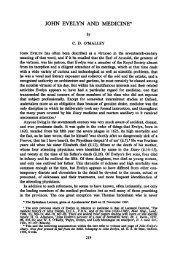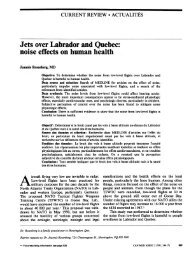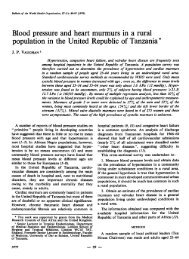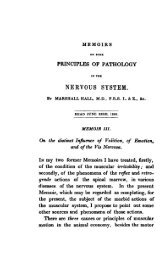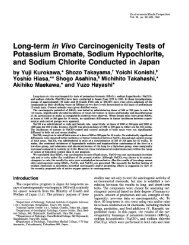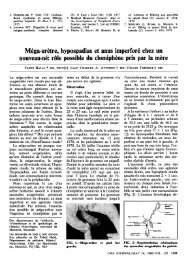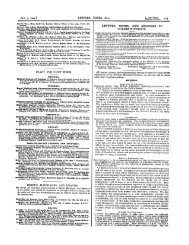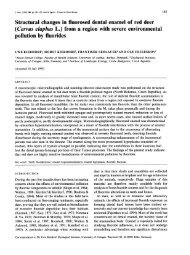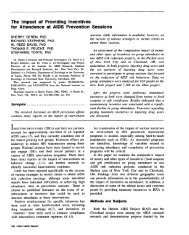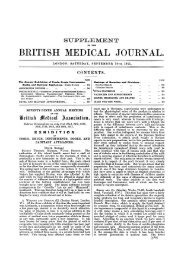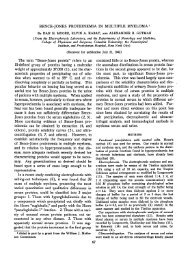You also want an ePaper? Increase the reach of your titles
YUMPU automatically turns print PDFs into web optimized ePapers that Google loves.
JUNE 20, 1959 OBITUARY BRmsH 1593<br />
MFDICAL JOURNAL<br />
his funeral at Felinfoel church paid tribute to the affection<br />
which everyone held for him. He was in single-handed<br />
practice until 1952, when he decided to join forces with a<br />
three-partner practice. We were a very happy quartet. He<br />
was essentially a family man, and our thoughts and<br />
sympathies go out to his widow, daughter, and young son.<br />
We also extend our condolences to his sister, Mrs. D.<br />
Haddon-Jones. I shall miss a loyal, cheerful, and helpful<br />
colleague and friend.<br />
H. S. CARTER, M.D., D.P.H.<br />
Dr. Hartley S. Carter, city bacteriologist in the health<br />
and welfare department of Glasgow Corporation for the<br />
past 11 years, died in hospital on May 14 after a few<br />
days' illness. He was 71 years of age.<br />
Hartley Sidney Carter was born in Leeds on November 7,<br />
1887, the son of George Henry Carter, a building contractor.<br />
For several years before graduation he was on the staff<br />
of the pathological and bacteriological department of the<br />
University of Leeds. After graduating M.B., <strong>Ch</strong>.B., with<br />
first-class honours, in 1917, he proceeded to the M.D. four<br />
years later, gaining distinction. He obtained the D.P.H., with<br />
special commendation, at the University of Leeds in 1931.<br />
After graduation he held the appointments of house-surgeon<br />
at the Leeds Hospital for Women and <strong>Ch</strong>ildren and resident<br />
medical officer at Leeds Public Dispensary. During the first<br />
world war he served for two years as a captain in the<br />
R.A.M.C., being for a year in charge of the pathological<br />
and bacteriological laboratory of the 2nd Northern General<br />
Hospital with 1,000 beds. After a short period in general<br />
practice he held posts with the Ministry of Pensions in Leeds,<br />
first as senior medical officer at Beckett Park Hospital and<br />
subsequently as senior medical officer and deputy medical<br />
superintendent at <strong>Ch</strong>apel Allerton Hospital, where, in<br />
addition to having charge of medical beds, he was in charge<br />
of the pathological and bacteriological laboratory.<br />
Dr. Carter joined the Glasgow public health laboratory as<br />
senior assistant bacteriologist in 1932, subsequently becoming<br />
deputy city bacteriologist before his appointment in 1948 to<br />
the post of city bacteriologist, which he held until he died.<br />
Early in his medical career he began to take an interest in<br />
pathology and bacteriology, which soon became his life work.<br />
He concentrated particularly on the epidemiological aspects<br />
of infectious disease. In Glasgow he made a special<br />
investigation of diphtheria and had contributed largely to<br />
the knowledge of its local trends and epidemiology. Having<br />
a wide experience of his subject, he maintained and greatly<br />
improved the standard of bacteriological work in the<br />
Glasgow public health laboratory. He was regularly<br />
consulted not only by the medical staff of the department<br />
but also by hospitals and by general practitioners.<br />
Dr. Carter was widely read and kept himself abreast of<br />
most aspects of medicine. He wrote extensively on medical<br />
references in classical literature, contributions which were<br />
outstanding for their content and for their clear and concise<br />
phraseology. A charming and helpful colleague, he had a<br />
youthful outlook unusual in a man of his age. His death<br />
has been keenly felt by his staff and by the members of the<br />
department. He leaves a widow to whom we extend our<br />
warmest sympathy.-W. A. H.<br />
W. D. COGHILL, M.B., <strong>Ch</strong>.B.<br />
Dr. W. D. Coghill, who was a leading figure in the<br />
medical life of Coventry for many years, died suddenly<br />
on May 16. He was 74 years of age.<br />
William David Coghill was born at Edinburgh on<br />
December 19, 1884, and studied medicine at Edinburgh<br />
University, where he graduated M.B., <strong>Ch</strong>.B. in 1907.<br />
After graduation he held resident appointments at the<br />
Carmarthen Infirmary, the Leicester Poor Law Infirmary,<br />
and the New Cross Infirmary, Wolverhampton, before<br />
taking up the appointment in 1912 of medical superintendent<br />
of Gulson Hospital, Coventry. At this hospital he did<br />
valuable service during the first world war, adding to his<br />
arduous duties the solution of the many difficult and<br />
dangerous industrial medical problems of that time,<br />
particularly at the important Coventry factory of White and<br />
Poppe. In 1918 he was invited to succeed the late Mr.<br />
S. A. Ballantyne in his practice in Coventry, and there he<br />
remained in constant service to his patients, even after his<br />
retirement in October, 1958. During the second world war<br />
he was appointed medical officer in charge of a first-aid post,<br />
a task which carried many serious responsibilities during<br />
the bombing attacks on Coventry.<br />
J. S. writes: Much of Dr. W. D. Coghill's long<br />
professional career was devoted to an active association with<br />
medical affairs. He was a former chairman of the Coventry<br />
Division of the British Medical Association. From the<br />
date of inception of the National Health Service he served<br />
as chairman of the local medical committee and vicechairman<br />
of the executive council. Previously he had<br />
been for many years a member of the Coventry Insurance<br />
Committee and chairman of the local medical and panel<br />
committee. In the many important duties in these and<br />
other medical committees his wise counsel proved<br />
invaluable. His sympathy and understanding of the varied<br />
problems affecting the younger members of the medical<br />
profession will be remembered by many with gratitude. In<br />
demeanour always calm and wise, he had an obvious<br />
integrity which endeared him to professional colleagues,<br />
patients, and all who knew him. Always a staunch<br />
supporter of Coventry City football club, he was for over<br />
30 years its medical officer. Golf also had been one of his<br />
many interests, and he was until recent years a member of<br />
Coventry Hearsall club.<br />
He married in 1912 Florence Winwood, who survives him,<br />
together with a son, Dr. Peter Coghill, and a daughter, Dr.<br />
Margaret Rudd.<br />
J. R. ANDERSON, M.B., <strong>Ch</strong>.B.<br />
Dr. J. R. Anderson, who was in general practice at<br />
Rotherham, Yorkshire, for many years, died on May 21<br />
at his home at Copdeck, Suffolk, where he had been<br />
living in retirement. He was 83 years of age.<br />
James Robertson Anderson was born in Aberdeenshire<br />
on October 5, 1875, a son of the manse, but his boyhood<br />
was spent at Sandwick, Orkney, where his father was<br />
minister. There he learned to fish for trout in the Loch of<br />
Stennes and shoot grouse on the Harray Moors. Until<br />
five years ago, when his health began to fail, he returned<br />
each August, except during the war years, to the scenes and<br />
sports of his boyhood. He was educated at Fochabers<br />
Academy and at Edinburgh University, where he graduated<br />
in 1898. He spent a year in postgraduate study as a<br />
demonstrator of anatomy and physiology in the university<br />
and then entered general practice as an assistant in<br />
Edinburgh and later in Derbyshire. He was house-surgeon<br />
at the Rotherham Hospital from 1900 to 1902, and was<br />
appointed honorary surgeon in 1907. He retired on<br />
December 31, 1935. From 1916 to 1919 he served in the<br />
R.A.M.C. as a surgeon in hospitals in Malta and France.<br />
He was mentioned in dispatches, and for his services to the<br />
French received the Mddaille d'Honneur en Argent. He<br />
finished his Army career as commanding officer of the 58th<br />
Scottish General Hospital, with the rank of major. During<br />
the second world war he was deputy chairman of a<br />
recruiting board in Ipswich; later, and up to two years ago,<br />
he held a similar position under the Ministry of Pensions<br />
and National Insurance.<br />
He was in general practice in Rotherham for over 30<br />
years, but even so he did a great deal of first-class surgical<br />
work at the hospital. He had a flair, almost a clinical<br />
instinct, for making a correct diagnosis, and was tireless in<br />
his work for the comfort and well-being of his patients. His<br />
surgical judgment was such that he knew his own


